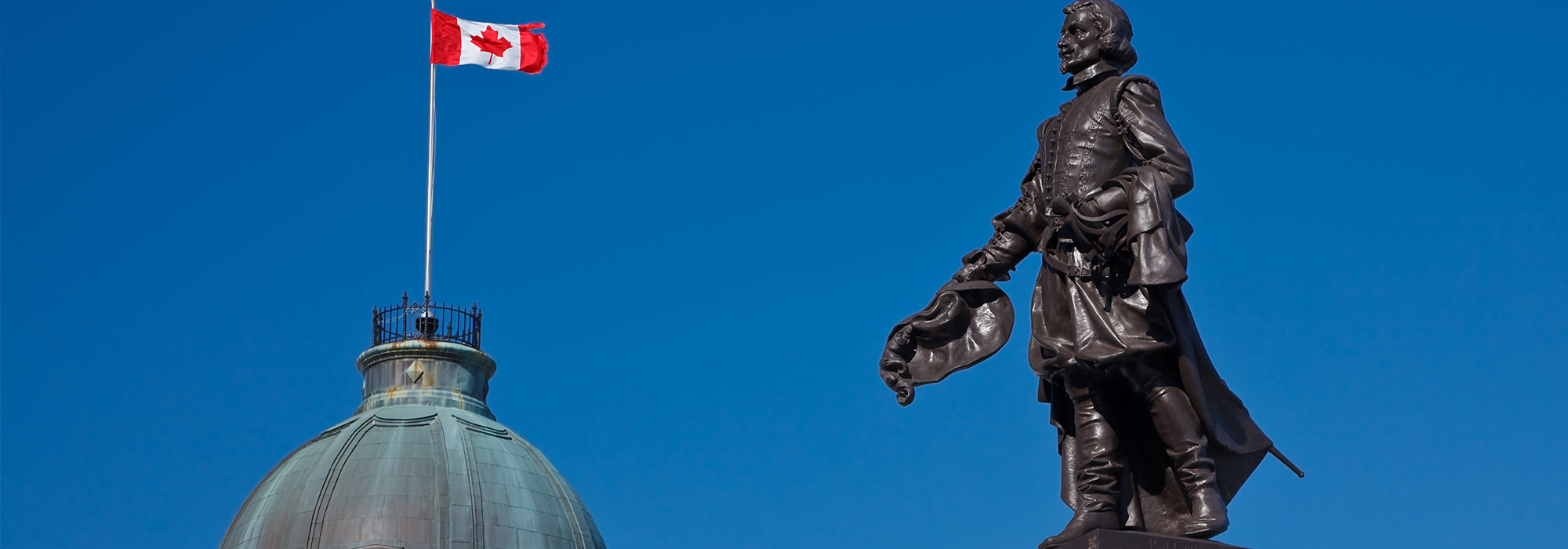
I am not an historian. I am not a biographer. I am not even a journalist or an editor. So asking me to review this celebrated book, Champlain’s Dream, by award-winning author David Hackett Fischer, may seem a case of mistaken identity, if not deliberate deception. But here’s a confession: I am a real history nut. In high school, I was actually a history nerd. The bane of every Quebec high schooler’s existence is a grade 10 exam, required for matriculation, on Canadian —and mainly New France—history. For my groaning school chums, Samuel de Champlain was yet another old guy whose name and dates had to be memorized for the final exam.
For me, he was the most romantic thing since Donny Osmond! I was literally swept up in the exploits of Samuel de Champlain and the founding of New France. So you can imagine my genuine delight when I learned about a new book on that dreamy fellow, titled, appropriately enough, Champlain’s Dream. And what a story! My first reaction on reading it was that my school-girl crush was now vindicated: this guy was too good to be true! We learn of Samuel de Champlain as a daring adventurer, a respected mariner, an accomplished geographer and cartographer, a successful diplomat, a victorious military leader, a canny survivor of court politics and a dedicated settler of New France. Not only that, but he also had that extra something, that oomph, that mojo, that the Huron people called orenda: the spiritual or mystical power of something beyond most ordinary mortals, of a truly exceptional figure.
It is this evocative orenda that David Hackett Fischer brings to life for us in Champlain’s Dream. In doing so, he demonstrates a little bit of his own orenda in the absolute mastery of this book in unravelling the central mystery of Champlain the man and his mission. Fischer, a respected professor of history at Brandeis University in Massachusetts, and a Pulitzer Prize winner in American history, offers his readers, scholars or not — fans or not! — what is surely the most definitive biography of Samuel de Champlain ever assembled, and probably the one that will stand the test of time for years and years to come. And, perhaps even more important, this book serves as a seminal contribution to the study of Champlain’s era — in Quebec, Acadia, the northern United States and France — in recent memory.
Champlain’s Dream is, as Jeff Simpson related in the Globe and Mail, “history in the grand style, a blend of the old-style narrative about great men and amazing deeds, and the newer contextual narratives of race, social currents, and localities.” With a dashing central figure, an era of conflict, crisis, discovery and adventure, all in the capable hands of this first-rate cultural historian and page-turning author, this book offers a complex and utterly fascinating journey: not, as Max Boot in the New York Times wrote, to “shed light on what remains a relatively obscure corner of our continent’s history” (finally, Americans now know who Lake Champlain was named for) but rather, for us, here in this vibrant part of North America, to illuminate and inspire a reflection on the key markers of Canadians’ and Quebecers’ essential core of being.
Fischer does this in focusing his story of Champlain in three dimensions: his evocative dream, his gift of dialogue and his singular determination in realizing the promise of New France.
Here, precisely, is the secret of Champlain’s Dream: it is a resolutely academic book, with incredible detail in its historical scholarship, but with its engaging tone and broad social outlook, of real appeal to a wider audience.
Samuel de Champlain may have been born into the waning years of a medieval era, but he was, as Fischer tells us, a level-headed dreamer whose formative years were shaped by some of the most brutal events of French history — the religious wars of the 16th century — and the most significant events of North American history, as European monarchies began to claim and settle the New World, often in ways that were outrageously cruel to native peoples, as Champlain witnessed himself in his travels through the Caribbean. As Fischer reveals, Champlain was inspired not by exploration for exploitation, but rather by what discoveries in the New World revealed about different places and people, and what it could make possible.
As an explorer and cartographer, Champlain recounts in his marvellous books and maps the dreamy paysages and harsh beauty of this new land. As a géographe du roi, Champlain shared with his patron, Henri IV, in the years after Jacques Cartier’s voyages, a goal to “convert that geographical expression into an actual country called la Nouvelle France.” That was part of the dream. But more importantly, Champlain was interested in the New World not as an end in itself but as a means to an end. As a modern thinker, he was fascinated by knowledge, science and religion: in essence, he was a humanist in that pivotal period between the Renaissance and the Enlightenment. That is why his dream was not simply about exploration, colonization and conversion, but about creating a new and better way of life in the New World. It was a dream of new understanding between peoples, a truly modern and, some would say, as yet unrealized dream.
The key to that better life would depend, as Champlain knew, on building and nurturing relationships, with supporters at court, with religious groups and even factions, with mariners and merchants, and most important of all, with the existing peoples of the New World. This is where Champlain’s gift of dialogue would become crucial. Time and again, Fischer illustrates the capacity of Champlain to embark on new friendships, defuse tense situations and manœuvre through deadly storms — both real ones in the treacherous North Atlantic and in the cruel Quebec winters and the ones involving rebellious settlers and imposing Mohawk warriors.
He was, as we say in Quebec, very sympa, sympathetic in who he was and in what he did. He was courageous, no doubt, but aided by an ease of manner, that bonhomie intrinsic to his upbringing in the French region of Saint-Onge, and what today Quebecers might call le gros bon sens, which that drew all manner of people to him and kept them in his confidence. Fischer outlines just how extraordinary the challenge was in New France: “Champlain had to maintain order among a turbulent set of colonists and neighbors in a disorderly and sometimes violent world. He had to keep the peace between Catholics and Protestants, Indians and Europeans, soldiers and civilians, seamen and shopkeepers, farmers and traders, rival companies and royal officials…He tended to become a mediator in an effort to reconcile rival interests, resolve conflicts of principle and harmonize different ideas of ethics and justice in a way that all parties could regard as just.”
This would all have meant little without the determination Champlain displayed, which is remarkably described throughout the book. Without it, New France might well have remained but a passing dream. This was the determination with which he safely crossed the Atlantic over two dozen times, with which he gamely attempted settlement after settlement, despite the disheartening failures of attempts in Acadia and the tenuous survival of those in the St. Lawrence valley. It was the determination he demonstrated in trying to make peace with native peoples, and in inspiring settlers to realize their dreams.
And perhaps most of all, it was the unrelenting determination that Champlain showed in France itself: to build an “American circle” of supporters, benefactors and businessmen in raising the money for his highly risky adventures; to convince influential leaders of the Church to lend their legitimacy to the project; and to attract and retain the interest of the French court — even when seen as an outsider, from the western boonies, and worse still, a commoner as far as the nobles who controlled it were concerned — in making the initial settlement and eventual colonization of New France a central goal of successive kings and their ministers. Fischer explains it thus: “At court, he used his influence for his cause, and not for himself…Like most great workers he kept his focus on the work itself and not in its rewards. For such a man in such a cause, the absence of honors became an honor in itself.”
David Hackett Fischer has certainly escaped this fate, as the honours have been pouring in for this worthy book both in the United States and in Canada. In addition, the book was recently short-listed for the munificent Cundill International Prize in History at McGill University, which is specifically geared to celebrate books that demonstrate a “profound literary, social and academic impact in the area of history.”
Here, precisely, is the secret of Champlain’s Dream: it is a resolutely academic book, with incredible detail in its historical scholarship, but with its engaging tone and broad social outlook, it is of real appeal to a wider audience. Be prepared to spend considerable time perusing not only the text, but the appendices, notes and maps, all presented in an accessible and lively manner. Here we learn the fascinating details of 16thand 17th-century ships and map-making, of the varied nature of Aboriginal peoples and the questions surrounding key battles, of the extensive memories that Champlain inspired through the centuries, and the controversies between historians on who he was and what he did. These debates will certainly be refuelled once the book is published in its French translation, but there is no doubt that it is already making a huge and singular impact on the way we understand the history of Quebec, Canada, France and New France itself.
A pesky political scientist — who, me? — might ask, Where’s the punch line? Did Champlain’s dream actually succeed or not? That, indeed, is a question for us all to contemplate: whether the influence of Champlain did fashion a new world in which we aspire to and have achieved a better way of life, a more humanistic social universe. Again, we can debate the merits and legacy of Samuel de Champlain’s dream but there is no doubt that David Hackett Fischer, in bringing to life Champlain’s Dream, has ended up with a real success.
Photo: Shutterstock









